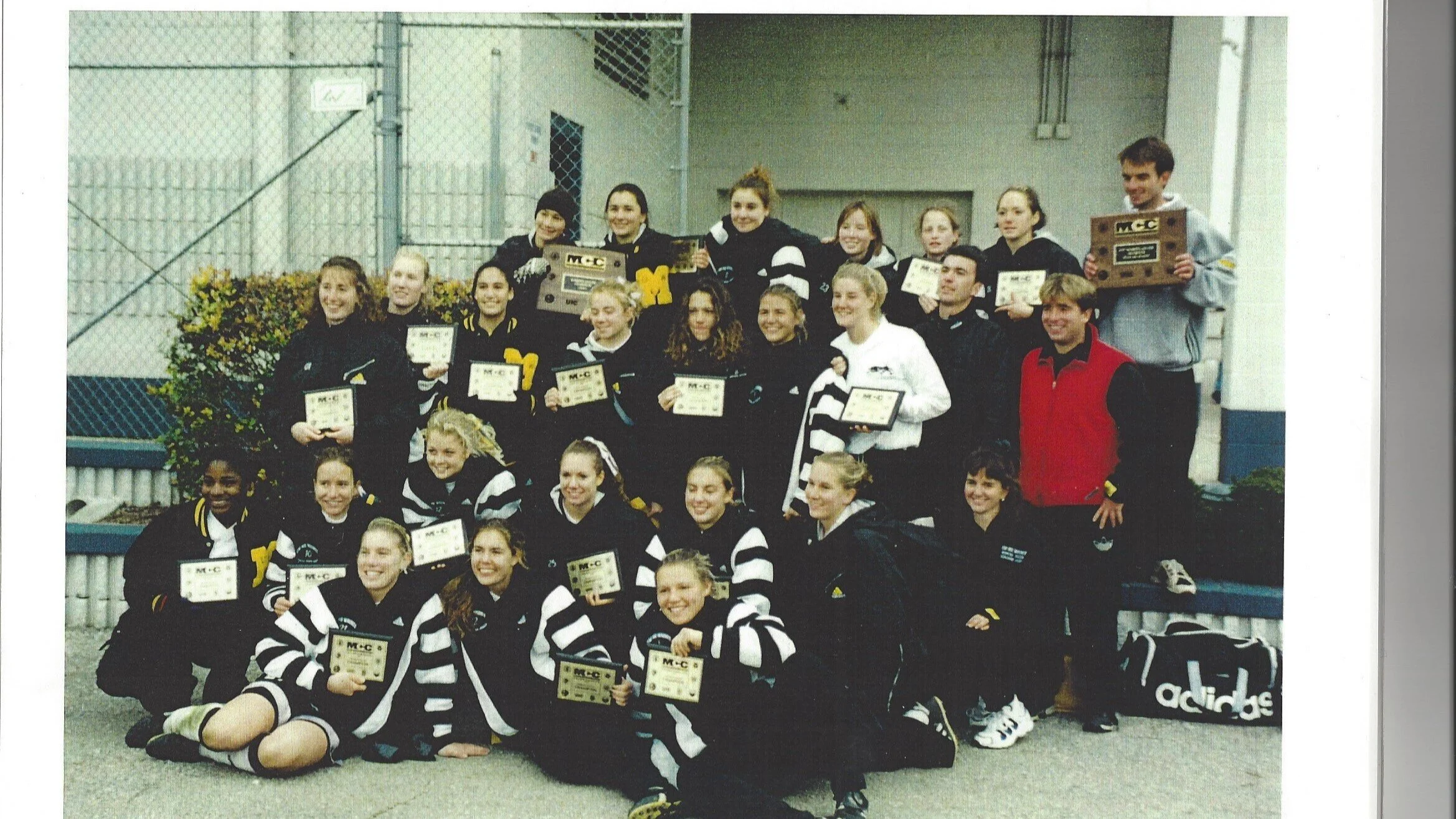You Go Sister, Just Don't Take my Job
Six male coaches and one female coach met on a cool autumn evening to swap soccer stories, sip beers and drink way too many shots of some concoction of Leopard Juice and tequila. We shared increasingly slurred and melodramatic stories of difficult players, blowhard parents, farsighted referees, ignorant athletic directors and soul-sucking losses. We were having a great time.
Then one guy said, “I don’t think women should be coaches. No offense, that’s just what I think.”
Everyone laughed – with him, at him. How else could you respond to a comment like that. And no one laughed harder than the lone female coach, who, by the way, has skin thick as elephant hide. She knew he was just saying what many men think.
Sports, in general, is historically misogynistic. In the 70s and 80s my grade school, St. Jude, had one soccer team – boys only. Sue, a good soccer player in my brother’s class, wasn’t allowed to play on the team though the school generously allowed her to be on the cheerleading squad. Sue, a reluctant cheerleader, went on to play college soccer. We had boys’ softball, not girls; boys’ basketball, not girls. Eventually they did offer volleyball to the girls because, apparently, volleyball is a girl’s sport.
Sometime in the late 80s and early 90s things started changing. Moms and, yes, dads realized their athletically inclined daughters were suffering blatant discrimination. So the dads started putting together teams and coaching their daughters. Problem solved, justice restored, equal opportunity for all. Hell, our government even passed Title IX in 1972 to make it easier for the suddenly “woke.”
One problem: the girls were playing, but the women weren’t coaching. Why? Because of misogynistic attitudes, coaching pedigrees, cultural norms, and market competition. Or said more simply--who holds the power. “I’m all for women coaches,” guys like me might say, “but they can’t have my job.”
I recently heard former U.S. Women’s National Team Coach Jill Ellis speak at the Women’s Soccer Symposium. She was great. The year before the speaker was terrible, primarily because he didn’t seem to realize he was speaking at the women’s soccer symposium nor understand his presentation was supposed to be interesting. Ellis, fresh off a World Cup Title, understood both. In the middle of her talk she brought up Affirmative Action. To paraphrase: “When I came to this country (Coach Ellis is British), I heard about this thing called Affirmative Action, but it didn’t make much sense to me. Shouldn’t you just hire the most qualified person. Then I learned more about the history of your country--voting suppression, civil rights bill and so on--and the notion that ensuring opportunities for a group that had always been denied opportunities seemed like a quite logical response to the problem. If you are a male coach, you have a 100% chance of being considered to coach a men’s team. If you’re a woman, you have 0% chance of coaching a men’s team and a 50% chance of coaching a women’s team. Therefore, a mandate requiring that some women get hired to coach women’s teams seems only fair.” Boom, drop the mic, saunter slowly off stage to thunderous applause.
One problem though – the number of female coaches. Why are there fewer female coaches? Ah, here we enter into a tangled web of dangerous and weakly supported opinions, especially when they are espoused by a white male soccer coach. Without judgment, and by that I mean don’t judge me, let’s consider potential reasons.
· Women haven’t been playing soccer as long as men have and thus do not have an equal amount of experience necessary to be an excellent coach
· Historically, soccer coach is not a women’s profession
· Misogynistic gender roles encourage women not to coach
· Women have fewer coaching opportunities and therefore are less likely to choose coaching as a profession
· Women are too sensitive for coaching
· Women should stick to teaching grade school and kindergarten
I hope you found a few of these opinions offensive, a few discomforting and a few obvious. And I hope we’re talking about the same ones.
For what it’s worth, here’s my take.
· There is nothing about the female brain or anatomy that prohibits or inhibits them from being great coaches. I’ve had female and male teachers and professors. I never thought, this class would be taught better by a male or a female – though I’ve never taken a women’s studies class taught by a man.
· Women haven’t been playing soccer as long as men have so there is a smaller pool of coaches to draw from. That’s changing.
· Former female players lacked good coaching role models. When women began playing in the 80s and early 90s many of their male coaches weren’t taking their game seriously. Anson Dorrance was an exception. He took the women’s game very seriously and North Carolina cleaned up. Yeah, he worked hard, coached well and tapped into the psyche of his players, but his timing was impeccable. Many of his male coach competitors were part time or biding their time until they got a men’s coaching job.
· Female soccer players don’t have female coaches as role models. A woman friend and former player who is now a college soccer coach recently said, “I was a high school and club swimmer, basketball and soccer player and I never had a female coach until I got to college – and she was an assistant. Nevertheless, I probably wouldn’t have chosen this profession without her example.” That’s not just anecdotal, it’s real. We choose what we believe is attainable. If no one who looks like us is doing it, we don’t think it’s attainable.
· Women don’t watch the game as often or in the same way as men do. This comment might be controversial, perhaps patronizing. Though it wasn’t my observation (actually it was a woman coach’s observation) I tend to agree. Young girls don’t watch sports as often and as regularly as boys do. Is this because female athletes aren’t on TV as much? Is it because dads watch sports more than moms do? When I watch professional games with fellow coaches, we rewind the game over and over to see where players are positioned, what they are doing and why they are doing it. My female coach friend tells me, women don’t do this. I’m sure some do, but how many? I know Jill Ellis does.
· Family gender roles are changing – but slowly. Soccer work occurs during evenings and weekends. Dad needs to stay home with the kids if mom is going to be out there coaching. These are culturally influenced family decisions.
Eventually, 10, 20 or 30 years from now, women will coach men’s teams. We’ll look back at 2020 and say, “Sure seems strange that there weren’t any men’s teams coached by women.
Why do I believe this? Remember the bar story I opened with. All that back-slapping, inebriated coach-talk and the doofus who didn’t think women should be coaching. His eventual record against the sole woman coach who was with us--two wins and six losses. Next time I see him I’ll advise, “You should probably switch to coaching boys and men, but do it soon before the competition becomes too much for you.”






